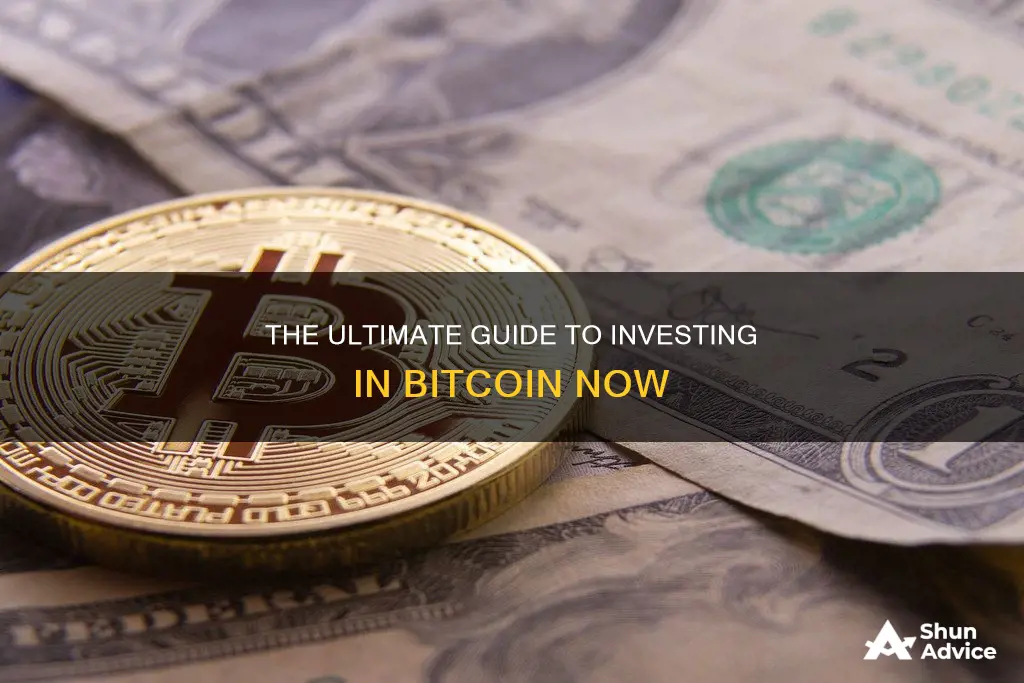
Bitcoin is a decentralised digital currency that operates without the oversight of banks and governments. It is a very high-risk investment due to its volatile nature. That means that Bitcoin values may rise or fall dramatically in value over a very short period—even as quickly as a few hours or days.
If you're thinking about investing in Bitcoin, you'll need to determine where you want to make a purchase. Most Bitcoin investors use cryptocurrency exchanges, such as Coinbase, Binance, Kraken, Gemini, and Bitfinex.
Once you've chosen an exchange, you'll need to fund your account and place your first order. It's important to note that investing in Bitcoin is very risky, and it's recommended that you carefully determine your risk tolerance and review your investment strategy before purchasing any Bitcoin.
You can also invest in Bitcoin indirectly by investing in companies that utilise Bitcoin technology or participating in Bitcoin mining.
| Characteristics | Values |
|---|---|
| How to buy Bitcoin | Via a cryptocurrency exchange, traditional stockbroker, money transfer app, Bitcoin ATM, or Bitcoin ETF |
| Cryptocurrency exchanges | Gemini, Kraken, Coinbase, Crypto.com |
| Traditional stockbrokers | Robinhood, Webull, TradeStation, Fidelity |
| Money transfer apps | PayPal, Venmo, Cash App |
| Bitcoin ATMs | Often found in convenience stores |
| Bitcoin ETFs | Available through traditional brokerage accounts |
| How to store Bitcoin | Hot wallet or cold wallet |
| Hot wallet | Stored by a trusted exchange or provider in the cloud; accessed through an app or computer browser on the internet |
| Cold wallet | Small, encrypted portable device that stores your Bitcoin offline |
| Risks | Very volatile asset; no central regulator; not backed by any physical asset; vulnerable to security breaches |
| Tips for investing in Bitcoin | Understand your risk tolerance; diversify your portfolio; start small |
| Strategies for investing in Bitcoin | Buy and hold; hold long term; trade on short-term volatility |
What You'll Learn

Choose a crypto exchange
Choosing a crypto exchange is a crucial step in investing in Bitcoin. Here are some factors to consider when selecting a crypto exchange:
Reputation and Security:
Look for a well-established and reputable exchange with a history of secure operations. Check for user reviews and the exchange's track record in addressing security issues. The harder the account creation process is, the better, as this indicates a more secure exchange. Additionally, ensure the exchange provides two-factor authentication and secure password protocols.
Location and Regulatory Compliance:
Always verify the physical address of the exchange. Transparency about their location is often a sign of legitimacy. Knowing the exchange's base will help you understand the legal implications of your investments. It also makes it easier to address any issues with regulators if your account is compromised.
Currency Pairs and Fees:
Consider the currency pairs offered by the exchange. If you're interested in trading specific cryptocurrencies, ensure the exchange supports them. Additionally, be mindful of the fees charged by the exchange. These can include transaction fees, trading fees, and blockchain transaction fees. Understand how these fees will impact your investing strategy, especially if you plan to be highly active in daily transactions.
Features and Functionality:
Different exchanges offer various features such as mobile trading apps, NFT platforms, staking rewards, and educational resources. Choose an exchange that aligns with your investing preferences and goals. If you're a hands-off trader, opt for a platform with automated trading tools.
Wallet Options:
Some exchanges provide built-in wallet storage, while others may require you to set up an external crypto wallet. Consider your preferred level of security and convenience when deciding between these options.
- Coinbase: One of the largest U.S.-based exchanges with a wide range of cryptocurrencies and features.
- Crypto.com: Popular for its user-friendly mobile trading app and various reward opportunities.
- Abra: Global exchange catering to institutions and private clients, offering comprehensive investment solutions.
- Kraken: Well-established exchange with robust security features and educational resources.
- Cash App Investing: User-friendly platform offering commission-free trades for Bitcoin.
Dogecoin: The Only Crypto You Need
You may want to see also

Get a Bitcoin wallet
A Bitcoin wallet is a place to store your Bitcoin safely. There are several types of Bitcoin wallets, including hosted wallets, non-custodial wallets, and hardware wallets.
Hosted wallets are the most popular and easy-to-set-up option. When you buy crypto using an app, your crypto is automatically held in a hosted wallet. It's called "hosted" because a third party keeps your crypto for you, similar to how a bank keeps your money in a checking or savings account. The main benefit of keeping your crypto in a hosted wallet is that if you forget your password, you won't lose your crypto. However, a drawback is that you can't access everything crypto has to offer.
Non-custodial wallets, also known as self-custody or "cold" wallets, put you in complete control of your crypto. They don't rely on a third party to keep your crypto safe. While they provide the software necessary to store your crypto, the responsibility of remembering and safeguarding your password falls entirely on you. If you lose or forget your password, there's no way to access your crypto.
Hardware wallets are physical devices, about the size of a thumb drive, that store the private keys to your crypto offline. They are considered one of the most secure methods to store funds and are ideal for storing large amounts of Bitcoin. However, they are more complex and costly than other types of wallets.
To set up a hosted wallet, choose a platform you trust, create your account with a secure password, and consider using two-step verification for an extra layer of security. Then, buy or transfer crypto to your wallet.
To set up a non-custodial wallet, download a wallet app, create your account (no personal info is required), and write down your private key (usually a random 12-word phrase) in a secure location. Then, transfer crypto to your wallet, as it's usually not possible to buy crypto using traditional currencies with a non-custodial wallet.
To set up a hardware wallet, purchase a well-known brand, install the software from the official website, and follow the instructions to create your wallet. Finally, transfer crypto to your wallet, as hardware wallets typically don't allow the purchase of crypto using traditional currencies.
Some popular options for Bitcoin wallets include Coinbase, PayPal, Robinhood, and Bitcoin.com Wallet.
Warren Buffett's Take on Bitcoin Investments
You may want to see also

Connect your wallet to a bank account
Connecting your wallet to a bank account is a crucial step in the process of investing in Bitcoin. This allows you to fund your cryptocurrency purchases and provides a convenient way to transfer funds between your bank and your chosen platform or exchange. Here's a detailed guide on how to connect your wallet to a bank account:
Choose a Reputable Exchange
The first step is to select a reputable cryptocurrency exchange that suits your needs. Popular options include Coinbase, Kraken, Gemini, and Binance, each offering its own set of features and supported countries. It's important to research the fees, security measures, and user interface of each exchange before making a decision.
Create an Account and Verify Your Identity
Once you've chosen an exchange, create an account by providing your personal information, such as your name, email address, and password. Some exchanges may also require you to set up two-factor authentication for added security. After creating your account, you will likely need to verify your identity by submitting documents such as a driver's license or passport. This process may vary depending on the exchange and your country of residence.
Add Your Bank Account Information
In your exchange account, look for the "Add Payment Method" or "Connect Bank Account" option. Here, you'll need to provide your bank account details, such as the account number, routing number, and account holder's name. Make sure the information you provide is accurate to avoid any issues with deposits or withdrawals.
Fund Your Account
After connecting your bank account, you can now transfer funds from your bank to your exchange account. This process may take a few days, depending on the exchange and your bank. Each exchange will have its own minimum and maximum deposit amounts, so be sure to review their policies before initiating a transfer.
Purchase Bitcoin
Once your account is funded, you're ready to buy Bitcoin! Go to the "Buy/Sell" section of your exchange and select Bitcoin as the cryptocurrency you want to purchase. Specify the amount you want to invest, taking into consideration the current price of Bitcoin and your investment strategy. Review your order details carefully before placing your first Bitcoin order.
It's important to note that connecting your wallet to a bank account is just one way to purchase Bitcoin. You can also use credit cards, debit cards, or peer-to-peer exchanges. Additionally, some exchanges may offer instant purchase options with higher fees. Always review the fees, security measures, and user agreements of the exchange or platform before making any transactions.
The Ultimate Guide to Investing in Litecoin Cash
You may want to see also

Place your Bitcoin order
Once you've chosen a crypto exchange and connected your account to a payment method, you can place your Bitcoin order.
There are several types of orders you can place when trading Bitcoin: market, limit, stop, and instant orders.
A market order is a standard crypto trade. It's a simple command to buy or sell Bitcoin at the best available price on that exchange. This is the most recent price that Bitcoin has been traded for. Market orders are also known as spot orders and are the easiest to implement on an exchange. They are executed almost instantly. All you have to do is enter how much cryptocurrency you would like to buy or sell, and the exchange will match you with an open order in the order book.
Instant orders are very similar to market orders. The only difference is that instant orders involve exchanges of fiat currencies, like US dollars, for cryptocurrencies, while market orders are denominated in cryptocurrencies.
Limit orders let you place an order to buy or sell Bitcoin at a certain price. You’ll need to tell the exchange how much you want to buy or sell, and the limit of the price you’re willing to accept. For example, you might place a limit order to buy one bitcoin for $20,000 but no more. That’s useful if you predict that the price of bitcoin will fall to $20,000, and you want to buy the coin as soon as it reaches your preferred price.
Stop orders are orders that activate once a specified price, known as a stop price, has been met. So if you placed a stop order to buy bitcoin at $20,000, once bitcoin hits that price, the order becomes a market order to buy bitcoin. These orders are not visible to the market until that price point has been reached. However, there is a risk that they may fill at a price higher than you wanted to pay.
BlackRock's Bitcoin ETF: A Guide to Investing
You may want to see also

Manage your Bitcoin investments
Once you have purchased Bitcoin, you will need to store it in a digital wallet. There are two types of wallets: hot wallets and cold wallets. Hot wallets are online wallets provided by crypto exchanges or software providers. They are susceptible to hacking, so it is important to select an insured and well-regulated provider. Cold wallets, on the other hand, are offline devices that store your crypto passkeys. While they protect against hacking, they are easier to misplace.
After setting up your wallet, you will need to decide how much Bitcoin to buy. You can buy Bitcoin in fractional shares, so you can invest as much or as little as you are comfortable with. Remember to only invest an amount that aligns with your financial goals and risk tolerance.
There are several Bitcoin investment strategies you can adopt, each suited to different investment styles and goals. Here are some of the most common strategies:
- Long-Term Holding (HODLing): This strategy involves buying Bitcoin and holding onto it for an extended period, regardless of market fluctuations. It is based on the belief that the value of Bitcoin will increase in the long run.
- Regular Buying through Dollar-Cost Averaging (DCA): DCA involves investing a fixed amount of money at regular intervals, regardless of Bitcoin’s price. This strategy can help to mitigate the impact of volatility.
- Swing Trading: This method involves holding onto Bitcoin for a short period to capitalise on expected upward or downward market shifts. It requires a good understanding of market trends and risk tolerance.
- Day Trading: Day trading involves buying and selling Bitcoin within the same day. It is a high-risk approach that demands constant market analysis.
It is important to regularly track the performance of your Bitcoin holdings and stay updated with market trends and regulatory news. This will help you make informed decisions and adapt your investment strategy as needed.
Dogecoin Investing: A Guide for Indians
You may want to see also
Frequently asked questions
There are several different exchanges that facilitate Bitcoin transactions. These exchanges are the middlemen of cryptocurrency investing, like a stock brokerage. Here are some of the most popular options: Coinbase, Binance, Kraken, Gemini, and Bitfinex.
When you purchase a coin, it’s stored in a “wallet,” which is where all your cryptocurrency is stored. There are two types of wallets you can get: a “hot wallet” or a “cold wallet.” A hot wallet is a wallet that’s operated by either your cryptocurrency exchange or by a provider. A cold wallet is the safest storage method for your coins. A cold wallet is an actual piece of hardware that stores your coins, usually a portable device that’s similar to a flash drive.
That depends on your risk tolerance and investment strategy. Some exchanges allow you to buy fractions of a single coin—your initial investment could be as low as $25.







